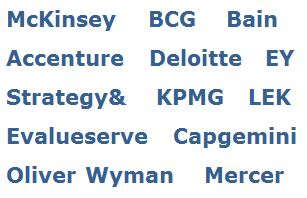Management consultants have good reason for cheer. Their industry segment in the US only has grown over 4% every year since 2009, reaching $165 billion in 2014 (IbisWorld).
good reason for cheer. Their industry segment in the US only has grown over 4% every year since 2009, reaching $165 billion in 2014 (IbisWorld).
Their revenue is poised to keep growing in the year to come. 2015 also presents new realities and challenges in an industry that is ever-evolving and that is impacted by the information commoditization.
These seven trends appear to be among those most poised to impact the industry in the year to come:
1. Growing sensitivity by companies to contain consulting expenses: The world’s best recognized management consulting firms, such as Accenture, Bain & Company, Boston Consulting Group or McKinsey & Company, do not come cheap, often charging retainers of $1 million a month or more and companies generally continue to see good return on this investment.
But shareholder and executive management pressures to increase profitability and reduce sales, general and administrative (SG&A) expenses are bringing deflationary pressures to management consulting pricing.
Firms that price their offerings competitively, which may be less than they charged in 2015, should grow their market share disproportionally.
2. Growing opportunities with startups and investment funds: As venture capital, private equity has become increasingly available as sources of support for startups with promising products or services, the trend for these startups to turn to management consultants is growing and will continue to grow in 2015.
When the amounts invested are over $10M, many funding sources make their support contingent on a management consultant’s involvement (especially for those startups launched by entrepreneurs for whom business management and business processes are not core capabilities).
3. Global presence, especially in Asia and the Middle East, will prove important: Many regions of the world continue to struggle with recessions and anemic growth, hampering demand for management consulting.
But two regions especially, Asia and the Middle East, are growing and also looking to upgrade and modernize business processes. Management consulting firms with an on-the-ground presence in these regions start to see growing opportunity.
4. Evolving management consultant functional demands: As technologies and industries evolve, and especially as new online and marketing opportunities are made available to them, the specific functions of management consulting are evolving and quickly beyond IT, process and organization.
Sales and marketing remains the area of highest demand followed by operational improvement and technology services and then a slew of other functions.
Importantly, larger firms were somewhat slow to develop significant digital marketing and public relations capabilities, which are now in high demand, which gave rise to many smaller agencies that now offer this niche service exclusively.
5. Growing number of smaller consultancies: The iconic brands of management consulting, firms like Accenture, Bain & Company, Boston Consulting and McKinsey & Company, still maintain significant market share and often are the go-to source for many of the largest Fortune 500 corporations.
But some of the niche specialties and better value-based consulting fees of smaller firms are increasing both the number and market share of smaller firms. Fastest growing segments include IT security, data analytics, board efficiency and digital transformation.
New comers also include large accounting firms such as Deloitte or KPMG who want to diversify in high margins professional services.
6. Certain industry sectors are expected to increase their use of management consultants at rates faster than the industry’s overall pace. The fast-growing health care, energy and pharmaceutical industries, for instance, are among the fastest growing industry segments for management consultants, a trend expected to continue into 2015.
7. Health care stakes: Finally in 2015, health insurance is proving both increasingly complex and costly, often beyond the internal capabilities of even large human resources departments.
The challenge is most prominent in United States and European markets, and many of these companies now point to health insurance management as the most significant challenge they face.
The US health budget represents more than France’s GDP. Health budgets will keep growing with the life extension and the rapidly aging populations. The entrenched interests make any necessary changes difficult to execute.
Management consulting firms poised to steer states and companies to cost-effective and yet quality insurance programs and manage the regulatory complexities associated with corporate health insurance, should be in high demand in 2015 and beyond.